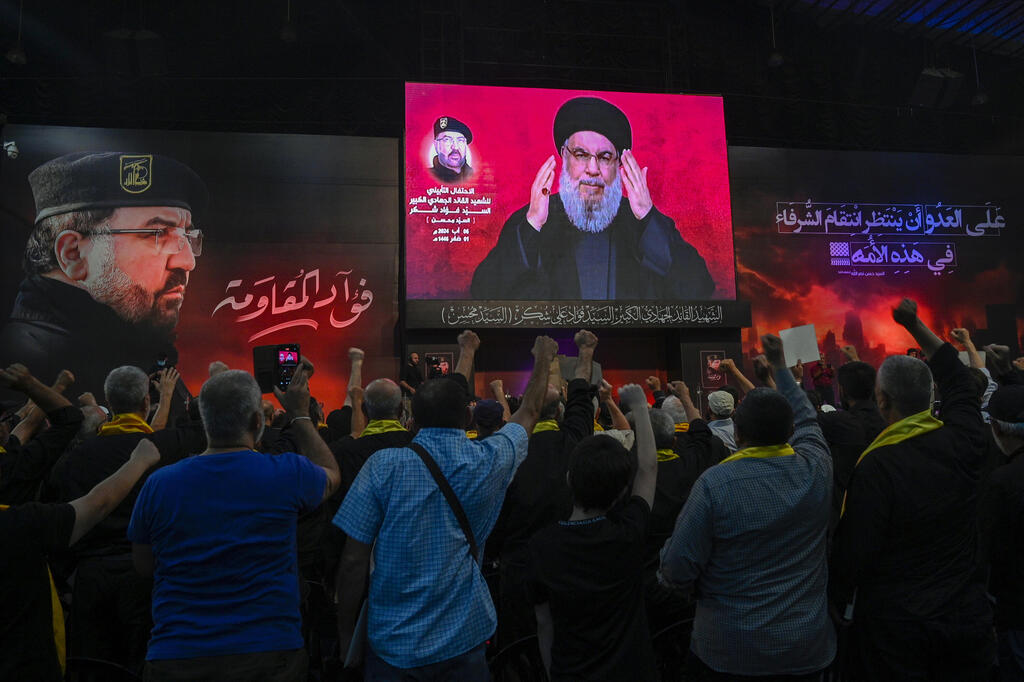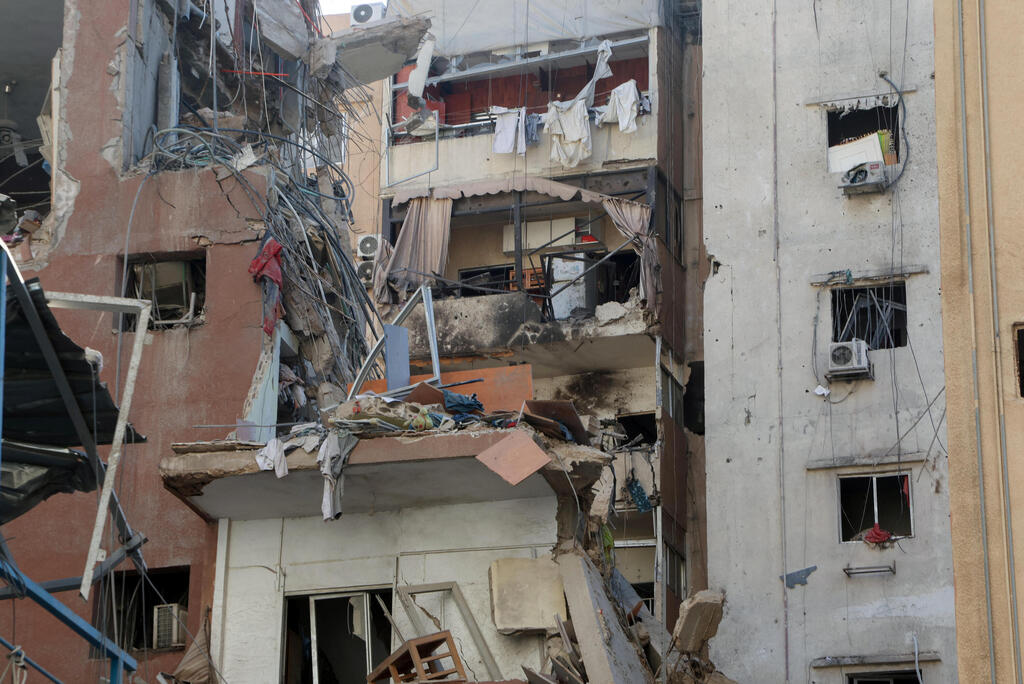As the exodus from Beirut continues, the Israeli Foreign Ministry has launched a campaign targeting Lebanese citizens with the message: "Your country has been taken hostage by Hezbollah." The campaign's videos, available in Arabic, French and English, amassed hundreds of thousands of views shortly after their release.
The campaign addresses Lebanese citizens directly, saying, "You have been taken hostage by Hezbollah, an organization integrated into the Lebanese government. The Beirut port explosion on August 4, 2020, devastated your capital, killing over 200 innocent people and injuring thousands more. Hezbollah is responsible for this atrocity, and to date, no one has been held accountable."
2 View gallery


Hezbollah leader Hassan Nasrallah speaks before his followers in Beirut's Dahieh district
(Photo: EPA/WAEL HAMZEH)
The video features a speaker with a Lebanese accent saying: "Our neighbors to the north: there is no territorial dispute between Israel and Lebanon. Israel seeks peace with you. The problem lies with Hezbollah and the Iranian agenda spreading throughout the region, which has been destroying your country for decades. Imagine your life without Hezbollah. Imagine your future without war. We, the people of Israel, can no longer allow Hezbollah to threaten us. It is time for the region to rid itself of Hezbollah. It is time for you in Lebanon to demand from your government to get rid of Hezbollah and Nasrallah."
Narration is delivered by Rawane Osman, a Lebanese woman born in Damascus to a Shiite mother and a Sunni father, who now resides in Germany. Since the massacre on October 7, she has been active on social media in English, Arabic and German, advocating for Israel's cause against Hamas. Osman also recently visited Israel to show solidarity.
The campaign comes at a sensitive time as tensions threaten to spread from southern Lebanon to Beirut. Israel has warned that any miscalculations by Hezbollah leader Hassan Nasrallah could lead to massive destruction in Lebanon. This fear is reflected in the recent mass exodus from Beirut and particularly its Dahieh district, a Hezbollah stronghold, amid fears of a harsh Israeli response to Hezbollah's retaliation for the assassination of its military commander Fuad Shukr. Social media videos showing Lebanese citizens panicking from Israeli Air Force jets' sonic booms over Beirut further underscore the widespread anxiety.
Batoul, a 29-year-old journalist, told AFP she supports Hezbollah but admits to being scared and seeking safety. "Anyone who says they want to stay in Dahieh while it's being bombed is lying to themselves," she said, declining to give her last name.
She recounted unsuccessful attempts to rent an apartment in "safe areas" outside Beirut not associated with Hezbollah, where landlords demanded exorbitant prices. One landlord even canceled an agreement for an apartment in Sawfar, east of Beirut, despite her willingness to pay six months' rent in advance.
A 55-year-old teacher and Hezbollah supporter, who also refused to be identified, found an apartment about 9 miles outside Beirut but pays $1,500 a month for it, a steep price in Lebanon. In another instance, she arrived at an apartment listed for $1,500 a month, only to find it actually cost $2,000. "Landlords know we have no choice," she said. "When war breaks out, people will pay any amount to be safe. But those without money will have to stay in Dahieh."
Riyad Fakhradin, a real estate agent in the Mount Lebanon area near Beirut, said apartments were snapped up "within half an hour to an hour of posting them." Some landlords asked him to raise their prices from around $500 a month to $2,000. "I refused," he said. "I don't profit from a crisis and don't want to exploit people's fear."
Ali, who rents out short-term apartments, said his phone "hasn't stopped ringing" before Nasrallah's speech on Tuesday. "I booked ten apartments in two days," he said. "Many people came to my office and booked on the spot, or called me and arrived within an hour."
Before Nasrallah's speech, Israeli Air Force jets circled over Dahieh three times, breaking the sound barrier and causing panic in the Lebanese capital, prompting residents to seek ways to leave the city. Nasrallah addressed this, saying, "The enemy might break the sound barrier in Dahieh during the speech as a provocation."
Unlike in the 2006 war with Israel, there is no consensus in Lebanon this time. The phenomenon of Israeli Air Force jets breaking the sound barrier is not new, but more videos documenting it have been published recently, likely because it has intensified. Among these videos is a TikTok video showing a conversation between two women, during which sonic booms from Israeli fighter jets can be heard. One woman screamed in panic, while her friend tried to calm her.
BBC Arabic reported this as part of psychological warfare, explaining the noises are not from strikes but from breaking the sound barrier. Interviewees in the report expressed fear, with one saying, "We are very scared when we hear it because it seems like the war has started." In some cases, these sonic booms have caused glass to break in homes and shops. Despite this, some Lebanese document themselves cheering the explosion sounds to show they are not afraid.
AFP noted the war has so far claimed about 560 lives in Lebanon, most of them terrorists, but at least 116 civilians. On the Israeli side, 22 soldiers and 25 civilians have been killed. The fear is that these numbers will rise in the event of escalation. During the Second Lebanon War in 2006, Hezbollah received support from non-Shiite sects in Lebanon, but now the polarization around the war is much greater, as Hezbollah initiated it unilaterally on October 8. "In 2006, there wasn't such polarization," said Batoul.
Meanwhile, as this sharp disagreement occupies the residents of Lebanon, the Foreign Ministry's campaign has been launched on the country's leading news sites, except those affiliated with Hezbollah, and also on social media, with a focus on X (formerly Twitter) and YouTube. This is the first time the ministry has launched a campaign on news sites of a country with which Israel has no diplomatic relations; the goal appears to be to reach those non-Hezbollah supporters forced to dramatically interrupt their daily lives due to a war they have no connection to.
David Saranga, head of the digital division at the Foreign Ministry who initiated the campaign, said, "We are aware of the dissatisfaction in Lebanon with Hezbollah, and Lebanese citizens are the primary target audience for our activity. At the same time, we also emphasize the responsibility of the Lebanese government for everything that happens on its territory."



